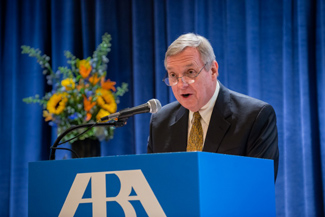Sen. Durbin promotes pro bono, honors award recipients

U.S. Sen. Dick Durbin speaking at the ABA’s Pro Bono Publico Awards luncheon. Photo by Edward Fox Photography.
U.S. Sen. Dick Durbin, D-Ill., speaking to an oft-cheering audience on his home turf, exhorted lawyers to do more pro bono work and to help finance free legal services provided by others in his keynote address Saturday at the ABA’s Pro Bono Publico Awards luncheon at the association’s annual meeting in Chicago.
Durbin’s anecdotes and illustrations ranged from humorous to sad and uplifting to outrageous as he discussed the needs and realities of legal services and hammered away at the social and human costs of over-incarceration that have resulted from the war on drugs launched by President Richard Nixon in 1971.
Addressing the matter of unmet legal needs, Durbin pointed out that one in 50 Americans qualify for free legal assistance, but about half of those who seek help are turned away. He called for more private funding of legal services, noting that the “most generous law firms donated a tenth of 1 percent” of revenues to such efforts (money that would be separate from the value of pro bono hours by firm lawyers). And he urged those in attendance to “encourage them to do more when it comes to legal aid.”
Durbin is the Democratic minority whip and sits on the Senate Judiciary Committee. He explained that those seeking federal judgeships are asked, during the committee’s vetting process, to detail specific efforts and the amount of time spent on pro bono work. Committee members also remind potential judges that the ABA Model Rules of Professional Conduct call for significant efforts in serving the disadvantaged. “You need a good answer to that if you want to be a federal judge,” Durbin said, drawing laughs from an audience that included a number of state and federal judges.
This year’s five organizations and individuals receiving the Pro Bono Publico Awards are:
Watch profile videos of Pro Bono Publico Award recipients:
Baylor University School of Law: By design one of the nation’s smallest law schools, Baylor’s pro bono work has had a big impact. The school’s efforts include working on foster-care adoptions and finalizing them with a celebration at the school in which students participate. And the Serving Those Who Served program provides a monthly legal advice clinic to help military veterans navigate various legal problems.
Daniel L. Brown: As pro bono chair of Sheppard Mullin Richter & Hampton in its New York City office, Brown has put his litigation skills to work in a number of pro bono areas, including disability rights and human rights. He sued and got a settlement with New York City for the nation’s most comprehensive plan for helping people with disabilities (Brown’s brother is a quadriplegic); and he handled an asylum case for a tortured human rights worker in the Sudan, who was given permission to remain in the U.S.
Jones Day: Through efforts by about 200 lawyers, associates and staff, the BigLaw firm developed a comprehensive website for information about same-sex relationships in all U.N.-recognized countries and relevant jurisdictions within them, such as each of the 50 states in the U.S. The firm also produced the Legal Recognition of Same-Sex Relationships Guide. Last spring, when the influx of unaccompanied children and women with children crossed the border to flee violence in Central America, Jones Day flooded the zone with legal help. The firm has taken on more than 100 such cases, with almost all its U.S. offices involved, and also provided help for nonprofit organizations.
Leslie Silverstein: A sole practitioner, Silverstein has no secretary and no paralegal in her office in Portland, Maine. But she does have a way of finding satisfaction through efforts that don’t bring money in the door. In her 26 years of practice, Silverstein has always been in either a small-firm or solo situation. About eight years ago, she began doing pro bono work as a matter of routine after volunteering on a domestic violence hotline. She soon was taking abuse cases as part of a volunteer project and then branched out to include political asylum cases. Her first case, which she began in 2011, is illustrative of part of the problem: It is still pending.
The United Airlines Legal Department: The company’s legal arm encourages participation in its pro bono and community service program, which offers a wide variety of opportunities. Those include working with dozens of nonprofit organizations, such as Cabrini Green Legal Aid, helping residents in the area get criminal records expunged and sealed, which can boost employment possibilities; developing a resource handbook for the homeless; promoting court reform initiatives for domestic violence victims; and helping immigrants fleeing torture and other life-threatening dangers.
• See what people are saying about the events on social media, and follow along with our full coverage of the 2015 ABA Annual Meeting.
Write a letter to the editor, share a story tip or update, or report an error.


